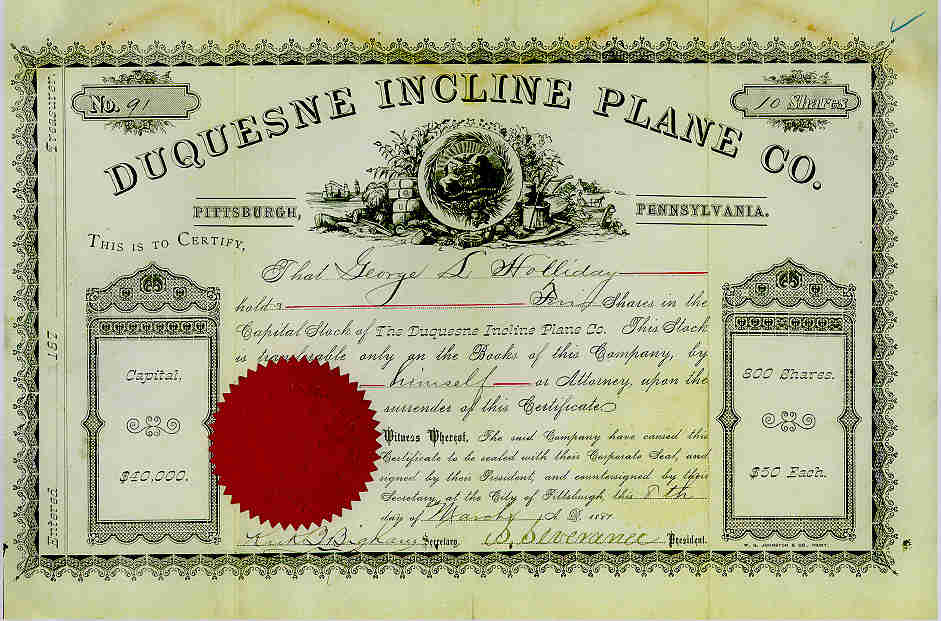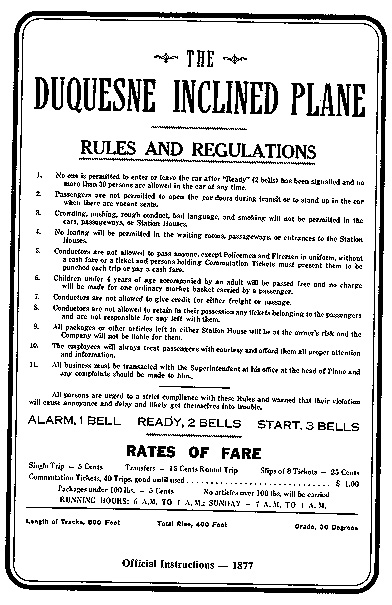

Although plans for a freight and passenger incline are known to have existed much earlier, financial backing was exceedingly hard to find--even the modest sum of $47,000--and actual construction was delayed. Eventually, of course, difficulties were overcome and the Incline was built. It was opened to the public May 20, 1877. The Duquesne Incline was the first Pittsburgh incline designed and built by Samuel Diescher, for Kirk Bigham and Associates. Mr. Diescher, an engineer, had become the country's foremost builder of inclines. He was also to design and build most of those that followed.
At the time of its public opening, it was one of four inclined planes serving the summit of Coal Hill, which later came to be known as Mount Washington. The Duquesne Incline was operated, from 1877 until 1962 by The Duquesne Inclined Plane Company. From 1964 until the present, the Incline has been operated by the Society for the Preservation of The Duquesne Heights Incline; it has been owned by the Port Authority of Allegheny County.

When The Duquesne Incline was opened to the public in May of 1877, it was one of four such inclined planes climbing Mount Washington, carrying passengers and freight to the residential area that had spread along the top of the bluff. Originally known as Coal Hill, the mountain itself had supplied coal fuel to the early settlers at the Point, the garrisons at the fort, and eventually to the local industries that appeared along the riverbanks as the town grew. Pittsburgh's early glass industry was particularly prevalent, near the current site of The Duquesne Incline. The primitive coal hoists that carried coal cars from the mine mouths on the hillside were the forerunners of the more elaborate cars that served as the Rapid Transit of their era.
The industrial base of Pittsburgh started expanding rapidly in the 1860s. This growth created a huge demand for labor, which was partially satisfied by immigrants from Europe. This growth also led to a serious housing shortage.
At this time, public transit was practically nonexistent. People needed to live within walking distance of their place of employment. While industry occupied most flat lands near the rivers, only the steep, surrounding hillsides provided land for housing. Coal Hill, later known as Mount Washington, was close to industry with alot of land available for building homes; but, there was a lack of good roads.
Immigrants, predominantly from Germany, settled Mount Washington and worked in the plants adjacent to the Monongahela River. They became weary of climbing steep footpaths and steps to their homes, from the river valley, after work. They remembered the Steilbahns(inclines) of their former country, and proposals were advanced to construct one or more of them along Coal Hill. The Monongahela Incline was the first of these to be built in 1869-1870; The Duquesne Incline followed in 1877.
In the 25 years following the opening of the Monongahela Incline, on May 28, 1870, at least 17 of these inclined planes were built in the Pittsburgh area; and as the city grew and expanded over the hills that almost surround it, inclines enjoyed great popularity and steady patronage. Speaking of The Duquesne Incline in the Autumn of 1880, Scientific American magazine noted that "on Sundays during the summer, 6,000 passengers are carried during the day and evening, the cars ascending and descending as rapidly as filled and emptied."
As the hilltop communities were virtually inaccessible by any other means, many of Pittsburgh's inclines carried horses and wagons as well as foot passengers. All carried some light freight. The meager roads that wound up the steep slopes were barely passable to a team of horses pulling a loaded wagon.
An early fare schedule at The Duquesne Incline advises that packages weighing less than 100 pounds would be carried for five cents, but "no charge will be made for one ordinary market basket carried by a passenger." Some of the freight, carried by The Duquesne Incline, traveled in a separate compartment, below the passenger compartment.
The rates of fare for foot passengers varied from one cent to five cents among the different inclines, with special commuter rates for regular riders. Well within the memory of present-day riders of The Duquesne Incline was the rectangular yellow commutation ticket with 39 numbers arranged on it to be punched by the conductor, one for each ride. For the 40th ride, the passenger surrendered the ticket.
It was many years before improved road-building methods and the invention of the electric streetcar and the motorcar gradually lessened the dependence of Pittsburgh residents on the hill-climbing inclines. As late as the 1940s, a Yellow Ticket still sold for one dollar, netting The Duquesne Incline only two and one-half cents per ride. But in spite of these low fares, the inclines have gradually disappeared. As part of the general decline in public transportation, only the Duquesne and Monongahela Inclines still exist in Pittsburgh.
The last Pittsburgh-area incline to close was the Castle Shannon Incline, which closed in 1964. This incline also served Mount Washington, with a lower station at the corner of East Carson Street and Arlington Avenue, just east of the present Station Square Light Rail Subway Station. This incline was closed by its owner, the Pittsburgh Railways Company, just prior to all of their streetcar and bus routes being taken-over by the Port Authority of Allegheny County. The Second Class County Port Authority Act of 1959 empowered the Authority to run all mass transit routes and modes, in Allegheny County; due to this state law, the Duquesne and Monongahela Inclines were also purchased by the Port Authority.
To ensure safety for patrons crossing busy West Carson Street, a pedestrian bridge across the street was completed in February of 1932. Originally, this bridge included steps leading directly to both inbound and outbound streetcar islands, in the middle of West Carson Street, in addition to connecting the Incline car boarding platforms(located on the second floor of the station building) to the northern sidewalk of West Carson Street(adjacent to the current parking lot).
Early Drawing(1880) of The Duquesne
Incline
from the book(German Language), "Schienenseilbahnen in aller Welt"
von Walter Hefti, Birkhauser verlag Basel, Switserland, 1975, ISBN
3-7643-0726-9
Rescue and Later History of The Duquesne
Incline
Facts and Figures Regarding The Duquesne Incline
Samuel Diescher, Builder of The Duquesne
Incline
Chronology of Pittsburgh Inclines
Observation Deck, with Beautiful Downtown View
Airport Busway Project and Proposed Duquesne Incline Station
From the Pittsburgh Tribune-Review, June 1, 1997:
The incline
builders: Forgotten engineers of Pittsburgh
From the Pittsburgh City Paper, April 29, 1998:
You Had to Ask: After Closing of the Troy Hill Incline
History of Andrew Carnegie and Carnegie Libraries
Return to History Cover Page
Return to Public Transportation
Return to Directions/Free Parking